In September 2019, Daiichi Sankyo visited the site of a mother and child healthcare improvement project in the Yunnan Province in China and held a commendation ceremony to reward people who have carried out distinguished service to the project.
This is a project we started in 2015 based on a five-year plan with Plan International, an international NGO. 2019 is the final year of activity and we visited the site to confirm the outcome of the project, reward deserving people, and confirm developments going forward.
<Visit to rural areas>
We visited Babao and Zhujie townships and observed health promotion carried out by village doctors. In Babao township, the doctors gave lectures with the theme of “how parents should respond to diarrhea in children.” Specifically, they lectured parents on the following: (1) the correct way to wash hands; (2) how to prevent diarrhea; (3) how to determine the symptoms of diarrhea from the stool; (4) how to prepare fluid replacements; and (5) an effective way to perform Chinese therapy massage. In Zhujie township, with the theme of “the correct way to breastfeed forbaby,” the doctors provided guidance on breastfeeding using pseudo-breasts and explained to mothers some things to pay attention to when breastfeeding.
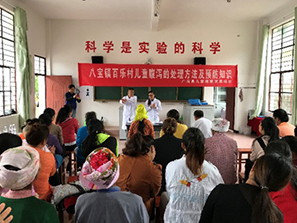
Health promotion in Babao town
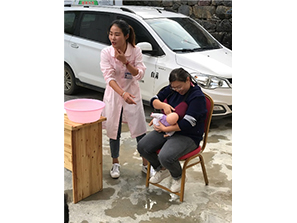
Health promotion in Zhujie township
<Rural volunteer activities by students of School of Public Health, Kunming Medical University>
With the aim of improving community-based healthcare, we have been carrying out awareness raising activities on an ongoing basis through university student volunteers as well as providing support for village doctors as a summer camp program. The summer camp is an opportunity for students to learn many things through creating and using hand-made materials that only university students come up with as well as through experiencing a rural medical setting as medical students.
During the visit, we visited the university and received a report from students who participated in the summer camp. One of the students commented, “My sense of duty has changed greatly, and so I would like to work to contribute to community healthcare in the future.” Through this visit we realized that this project has led to contributing to the development of young people toward future healthcare reform in rural areas. It has been determined that the activities of this project will be taken over by a youth organization in China after the end of the project.
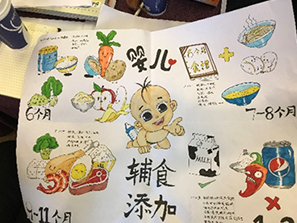
Development material created by university students

Activity report meeting of summer camp participants
<Report meeting on project site activities and commendation ceremony for deserving participants>
Members of this project who worked hard in the respective field reported their activities.
From Zhulin village, the following outcome was reported: the community center activity was carried out more than 70 times in total since its inception and more than 1,000 children have participated. As a result of taking the IMCI<font="small">* training, definite diagnoses are now possible for symptoms for which decisions could not be made with confidence previously. This has certainly increased the number of symptoms that have been prevented from becoming serious; learning how to communicate with residents in addition to performing diagnoses has improved the relationship with patients; and sharing new skills and information learned during visiting training at an urban medical center within the hospital has improved healthcare service. From the report of staff members who have been practicing healthcare and medical services on site, we realized that the project led to the improvement of pediatric care and raising health awareness in the community.</font="small">
Following the presentation, we commended eight people involved with the project who made contributions and presented certificates of merit and trophies to them.
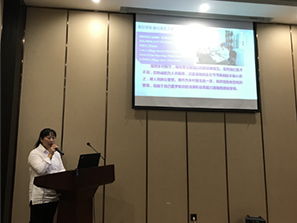
Presentation by a doctor in Babao township
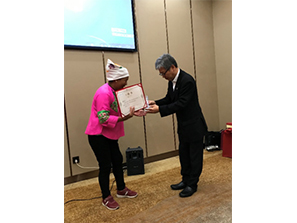
Presenting an award to a deserving person
*Integrated Management of Childhood Illness Strategy Training: A strategy adopting a standardized integrated management guideline for treating childhood illnesses compiled by the World Health Organization and UNICEF. The purpose of this strategy is to guide training using common materials to promote appropriate treatment and management of childhood illnesses and to facilitate the creation of healthcare systems for supporting these efforts.
The following outcome was confirmed from evaluating the activities over the last five years.
▶︎ Education has improved the quality of healthcare for children by health education providers. Thanks to techniques obtained through training, health education became easier for village residents to understand.
▶︎ In the area of pediatric care service, the number of clinics in the villages increased, the system improved through an increased number of doctors, and skills such as a definite early approach for early diagnosis of patients improved through acquiring such skills.
▶︎ Training for midwives improved their skills and so they can now take more definite measures.
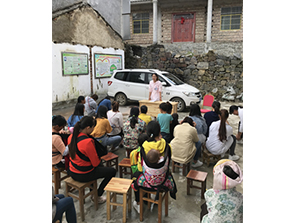
Health promotion
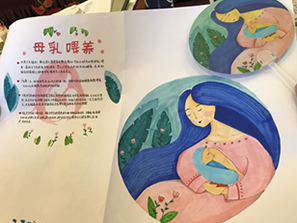
Development material using a fan
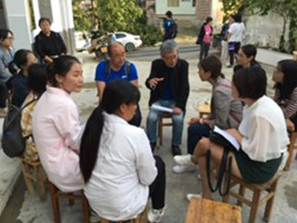
Interviews with village doctors and residents
Although we had been concerned about the continuation of this activity after the end of the project as a major issue, we were able to confirm during the visit that local residents are considering taking over the activity under their initiative.
We realize that as the outcome of contributing to the improvement of healthcare in this community through the five-year activity, the under-five mortality rate in rural areas of the site substantially improved.
Photograph provided by Plan International
*This activity is adopted as "Access Accelerated" program.